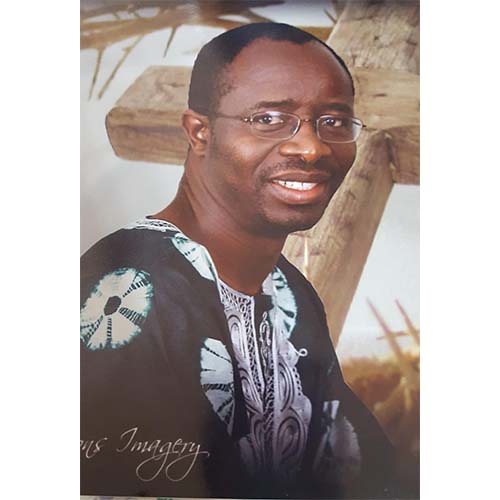WKU News
CEBS Student Spotlight: M.G. Matally
- Tuesday, November 16th, 2021

Name: M. Garswa Matally aka M.G. Matally
Major: Doctor of Psychology in Applied Psychology
What year are you in the program? I am in my 4th year of the program.
Hometown: I was born in a remote village named Dyededein, located in Grand Bassa County, Liberia, West Africa. I currently live in Owensboro, KY.
Why did you choose WKU’s PsyD in Applied Psychology program?
After years of waiting since completing my Master of Divinity at The Southern Baptist Theological Seminary, it dawned on me that I had yet to begin doctoral studies. Upon deciding that I wanted to study psychology to better understand human behavior, an essential element of theology and ministry, I realized that choosing an institution was no easy choice; I could not afford to pause my work as a full time pastor at One Faith Fellowship (formerly Church For All). I chose WKU PsyD for the not-too-distant commute from Owensboro to Bowling Green. More importantly, I selected WKU, because it offers me the flexibility to continue ministerial work at my church while studying psychology.
How have you already applied what you are learning?
I have been applying my knowledge in psychology to pastoral teaching, preaching, care, and counseling at church. I also work with justice-involved individuals, teaching reentry classes in the jail, as well as mentoring guys who are in reentry as they transition back into the community. To create a framework for impacting my community with what I am learning, I spearheaded the formation of Daviess County’s first reentry nonprofit – Genesis Reentry Skills, Inc. – only one of two such organizations in the State of Kentucky to date. I sometimes work with refugees who resettle in our community; this is very close to home, because I was once a war refugee and lived in a refugee camp in Ghana, West Africa, before migrating to the United States. Psychological training is equipping me to better understand and help the varied populations that I work with.
What do you hope to do after graduation?
I wish to continue working as a pastor, integrating psychology into ministerial work at church, continue reentry work with justice-involved persons in jail and in the community, and work with refugees that need my help or the help of my church. Also, I consider teaching a gift and would like to teach foundational psychology classes at a college or university, whether in America or Africa.
What experience(s) have you had during your years as a WKU student that have helped or is helping you prepare for a career after graduation?
The experiences that are shaping me largely come from specific courses I have taken at WKU. Human & Family Development and Family Systems Therapy gave me a deeper perspective on how family dynamics impact various members within a family. Individual Differences equipped to better understand how much psychological functioning is impacted by diverse, cultural backgrounds. Two classes on Intellectual Assessment have taught me to be careful and professional in how I gauge or report assessments of human intelligence. Practicum in Psychotherapy and Clinical Interviewing have prepared me to properly conceptualize mental health before deciding treatment. Presenting in class, roleplaying, and practicing on “clients” in the Psyche Clinic have been enlightening. These experiences will outlast the academic setting and impact my career after graduation.
What has been the best part of your WKU experience?
There have been so many “best parts” to this journey thus far, but if I have to choose “the best part,” it must be how ready and willing most of my professors have been in guiding my studies. My professors are available when I need them. In fact, I was shocked when one professor gave us (the class) his cell phone number, so we could reach him in case we needed his help while he was out of town! My emails and requests receive swift responses. I can’t say enough about how helpful faculty members have been. On several occasions I have been welcomed into a professor’s office when I was just walking by and wanted to ask a question, without making prior appointment with the faculty member. I consider that level of access is priceless!
Are there any life experiences that impacted you in your pursuit of obtaining this degree that you would like to share?
My family of origin had a history of severe mental illness: my mother, elder brother, and elder sister went insane at different times when I was in Liberia. After starting my own family, I have watched one of my children struggle with depression and another with social anxiety. They were huge reasons why I chose to begin and to pursue doctoral studies in psychology, and not theology, even though the latter would have been the shorter path to a doctorate degree. With the training I am receiving in the WKU PsyD program, I better understand the mental struggles of my children; it has made me a better listener, a better helper, a better dad. I am closer to my family members than ever before.
What advice do you have for future PsyD students?
Be realistic about the demands on your time: Don’t take more credit hours just because you want to complete the program quickly. With all the deficiency courses I’ve had to take because my master’s degree was not in psychology, it will take me much longer than my classmates to complete the program. But I engage in encouraging self-talk often just to stay positive and focused: “No classmate is my competition. I am my only competition. My standard is, pass every class and reach the finish line of graduation. That will be success, even if it takes me seven years!”
Some of the links on this page may require additional software to view.

